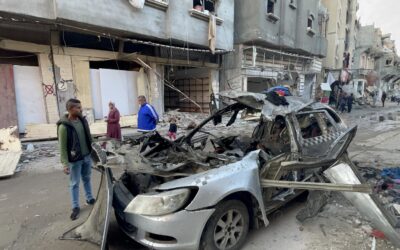
Estonia’s Top Diplomat: Stop Putin Now or Prepare for NATO-Russia War
SUBSCRIBER+EXCLUSIVE INTERVIEW — With a mere 1.2 million citizens, Estonia is among NATO’s smallest members, but its contributions to Ukraine have led the pack by […] More
What’s the outcome of President Trump’s trip last week to the Middle East?
I’ll focus mainly on what may be the after effects of the first days of his trip in Saudi Arabia, where he was treated like a visiting potentate.
“The House of Saud played Donald Trump like a fiddle…showering him in ceremony and accolades that pandered to his scandal-wracked administration’s need for diversion from its own self-imposed mistakes.” That’s from the insightful, May 21, Al-Monitor column by Bruce Riedel, a senior fellow at the Brookings Institution’s Center for the 21st Century Security and Intelligence.
Riedel, a retired 30-year, CIA Middle East analyst, added, “For the Saudis, it was also a diversion from their own blunders, especially the expensive and endless quagmire they created in Yemen.”
Needing each other, the Saudis and Trump last week both ignored candidate Trump’s continued 2016 complaints on the campaign trail that the kingdom was not paying for U.S. protection, without which it could not last. It was a view Trump repeated on April 28, just over a month ago, when he said, “Frankly, Saudi Arabia has not treated us fairly, because we are losing a tremendous amount of money in defending Saudi Arabia.”
All that vanished as Trump proudly announced in his May 22 main address in Riyadh to area Muslim leaders that he and the Saudis had signed agreements for some $400 billion in investments in the two countries, of which $110 million is to be U.S. arms purchases by Saudi Arabia. In addition, he spoke of the creation of two new centers located in the Gulf area devoted to fighting terrorism.
One is a Global Center for Combating Extremist Ideology, whose purpose is to have Muslim-majority countries take the lead in combating Islamic radicalization.
The center is part of a Saudi-U.S. Joint Strategic Vision Declaration that includes setting up a Joint Strategic Consultative Group that is to meet at least once a year.
The Global Center claims innovative software tools “capable of monitoring, classifying and analyzing any extremist content within six seconds of its online broadcast. The software will be used to quash an ever increasing growth of extremist recruiting and propagandizing on digital platforms,” according to one description.
The Saudi military put in place last month an Ideological War Center to monitor ISIS and al Qaeda on line through Facebook, Twitter, and YouTube.
The other joint center, to be called the Terrorist Financing Targeting Center, co-chaired by the Saudis and Americans and includes every member of the Gulf Cooperation Council. It is aimed at joining those countries together to prevent the financing of terrorism by their citizens.
In announcing this center, Trump said, “We must also strip them [terrorists] of their access to funds. We must cut off the financial channels that let ISIS sell oil, let extremists pay their fighters, and help terrorists smuggle their reinforcements.”
The goals of the financial center seem fairly modest.
The participants, according to their Memorandum of Understanding, will do such things as “Identify, track, and share information regarding terrorist financial networks and related activity of mutual concern, including related threats emanating from countries and terrorist organizations,” and conduct “regional workshops and other events focused on improving collective capabilities to combat terrorist finance.”
Worth noting, however, is a provision that says, “This MoU is not legally binding and is not intended to give rise to any rights or obligations under domestic or international law.”
The Washington Post’s Joby Warrick wrote last week that despite the new U.S.-Saudi cooperation, the Riyadh government blocked an American proposal in the United Nations Security Council to designate two Saudi-based ISIS affiliates on a U.N. terrorist list.
“Saudi opposition to the listing stemmed from concern about ‘reputational risks,’ which could lead to ‘losses in tourist revenue and higher insurance premiums’ for the kingdom,” Warrick wrote.
At a Foundation for the Defense of Democracies (FDD) conference on May 23, two days after Trump signed agreements in Saudi Arabia, former Secretary of Defense Robert Gates and several Middle East experts put some of the Riyadh agreements in context.
For example, Gates reminded the audience of the Jeddah Communique in 2014 that was signed by the exact same countries that signed again in Riyadh.
The Jeddah agreement called on the signatories “to do their share in the comprehensive strategy against ISIS, including: stopping the flow of foreign fighters through neighboring countries, countering financing of ISIS and other extremist groups, repudiating the ideologies of hate adopted by those terrorist groups, holding perpetrators of those hideousness’s accountable, ending their impunity trials and bringing them to justice.”
Gates last Tuesday pointed out that in Jeddah three years ago they were “agreeing to do exactly the same thing” as they did with Trump at Riyadh. Thereafter, Gates noted, when the U.S. suggested groups or individuals who we said were funding terrorists, they took action, but they hardly initiated investigations themselves. “Look, a lot of countries in that region, from time to time, have played both side of the street, let’s be honest,” Gates said.
David Weinberg, an FDD Senior Fellow who covers six Gulf monarchies and terror finance issues spoke about lack of follow up when the U.S. gets the United Nations to designates private individuals as terrorists or financing them.
“It’s not clear in which of these cases… how many of those individuals have been charged with crimes related to terror finance. It’s not clear how many and in which of those cases they’ve been convicted of a crime, and it’s not clear which of those individuals are currently behind bars or not,” Weinberg said.
As for the new Global Center for Combating Extremist Ideology with its amazing glowing orb, Weinberg said, “That Center was in the works for two years…They just repackaged it this weekend so they could have a glowing orb party.”
He said the real question is whether Saudi Arabia and other Gulf countries are “still sponsoring these sorts of hate preachers who incite the sort of ideology that’s so problematic?”
Another panelist, Husain Haqqani, former Pakistan Ambassador to the U.S. and now a Senior Fellow at the Hudson Institute, put the problem of stopping terrorist funding in more direct terms.
“Many of the reasons why a lot of these donors and people who fund terrorists in Qatar [for example] are not being arrested is that they are directly related to the Emir and to the regime itself. And they’re inter – they’re married to some of the, you know, members of the royal family. It’s like telling Donald Trump to go arrest Kushner, you know. It’s never going to happen.”
Mary Beth Long, former Assistant Secretary of Defense for International Security Affairs in the Obama administration, picked up on the problem saying, “It’s very sensitive about indigenous prosecutions and processes in most of the Gulf countries. And then as soon as pressure is taken off, you know, things tend to dribble on or off the table.”
She also pointed out another problem, “the idea that we’ll all agree on who are terrorists and on what instances terrorists will be deemed by the U.S. to be against our interests.”
Even the $110 billion package of arms for the Saudis needs a closer look. Most of what’s included was negotiated during the Obama administration, and represent letters of intent that still have to be worked out as actual contracts.
One last minute deal was made with the help of Trump son-in-law Jared Kushner for a THAAD missile defense system. On May 1, Kushner, with a Saudi delegation in the room with him, called Lockheed Martin CEO Marilyn Hewson, prime contractor on the THAAD system, and asked if she could lower the price. She said she would take it under consideration.
When the package was signed May 20 in Riyadh, Hewson was on hand.
Last Saturday afternoon, Trump appeared to dismiss most of what happened on the rest of the trip, including his five days in Europe, when he tweeted – much like a traveling salesman back from the road— “Bringing hundreds of billions of dollars back to the U.S.A. from the Middle East – which will mean JOBS, JOBS, JOBS!”
Related Articles

SUBSCRIBER+EXCLUSIVE INTERVIEW — With a mere 1.2 million citizens, Estonia is among NATO’s smallest members, but its contributions to Ukraine have led the pack by […] More

SUBSCRIBER+EXCLUSIVE BRIEFING — Drone weapons are part of the daily narrative of the war in Ukraine – from Russia’s use of Iranian drones against infrastructure […] More

SUBSCRIBER+ EXCLUSIVE ANALYSIS — Iran’s retaliatory strikes against Israel this weekend were both a potentially game-changing, historic first — and an underwhelming response. Historic, because […] More

SUBSCRIBER+EXCLUSIVE INTERVIEW — Ukraine was hit by a fresh round of Russian missile attacks on Thursday, strikes that targeted and damaged the country’s power grid […] More

SUBSCRIBER+ EXCLUSIVE REPORTING — The Israeli drone strike that killed three adult sons (who Israel says were Hamas operatives) and four grandchildren of Hamas’s Qatar-based […] More

BOTTOM LINE UP FRONT – In the spring of 2022, Ukraine beat back a Russian assault on the nation’s capital and punished the invaders on […] More
Search